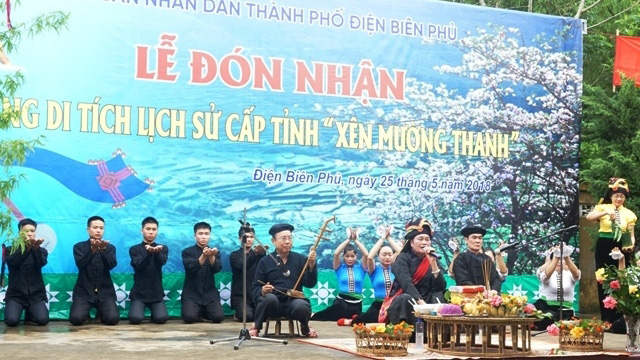


|
A ritual offering of Xen Muong
festival was recreated on the stage at a ceremony held in Dien Bien Phu city
on May 25 to receive a certificate honouring the festival as a provincial
historical heritage (Photo: Le Lan)
|
|
‘Xen’ in Thai ethnic language means worship or festive, while ‘Muong’ means
village. The festival is hosted by the village’s shaman, who is believed to
convey the people’s wishes to the gods.
It is said that the festival has been observed since the 13th
century by heads of villages in Muong Thanh valley. When a new village was
established, the village head selected an area called ‘Dong Xen’
(Forest of Worship), which hosted annual rituals to show gratitude to the
earth, the heaven and the predecessors who contributed to the fight against
invaders and the construction of the village.
It also aims to pray for peace, prosperity, favourable weather,
and the harmony between humanity and Mother Nature.
To start the festival, villagers prepare offerings, including a
buffalo, rice and wine, to present to the ancestors and the gods. The
festival includes a procession of offering trays, music and dances, sporting
events, and folk games.
Researcher on Thai ethnic folk culture, Luong Thi Dai, said that
the festival is celebrated annually during five days in the third or the
fourth lunar month. After the rituals, participants take part in folk games
such as tug of war, ‘to ma le’ (throwing seeds of the ‘ma le’ fruit), and
cock fighting.
Men and women also join in the singing of duets while elders
propose toasts and wish all the best to each other.
During the festival, Thai people observe some taboos of
receiving strangers, grinding rice, constructing new houses, hunting, and
going to forest for several days. Houses are also closed with green tree
branches hung outside.
According to 66 year-old Lo Van Don from Tong Khai village,
Thanh Nua commune, Dien Bien district, Xen Muong not only conveys the entire
community’s aspirations to the gods but it is also a sacred festival of Thai
ethnic group.
On normal days, Thai people never dare to enter the holy ‘Dong
Xien’ forest to collect firewood, pick bamboo shoots, or catch honey bee
swarms if they are not allowed.
However, after 1954, the festival is less practiced in Thai
ethnic communities. Over the past decade, thanks to the efforts made by the
provincial authorities and its cultural sector, the festival has been revived
in a number of village in Muong Thanh alley.
The festival was recently recognised as a provincial historical
heritage by the Dien Bien provincial People’s Committee in May this year. The
local authorities have called for further research and coordination between
locals and the cultural sector in building a dossier on the festival to seek
Ministry of Culture, Sports and Tourism’s recognition as a national
historical heritage.
|
Source: NDO